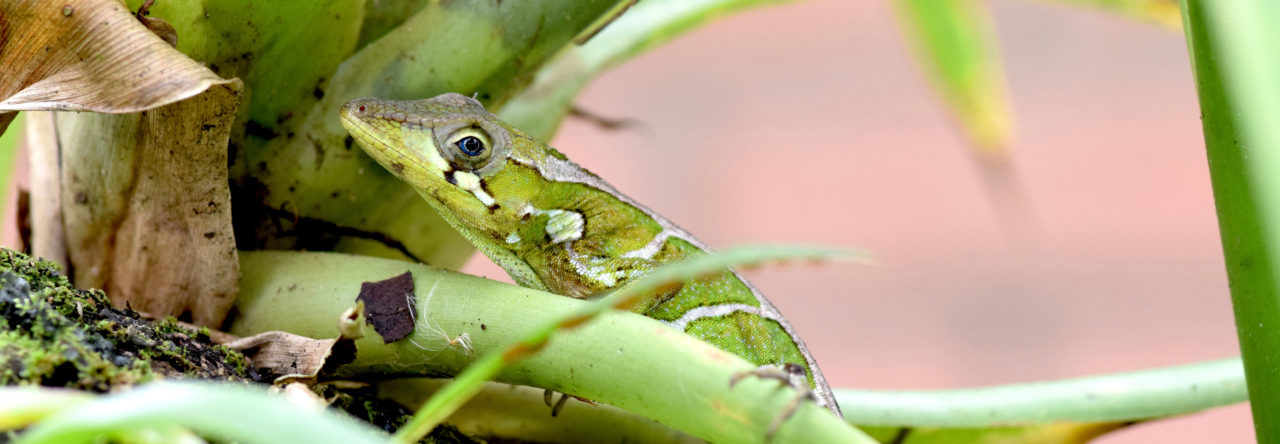Right now, the United States is wrestling with systemic racism at many levels in our society. And while one may wish to think nature and science stand outside of this issue, this is not the case. Nature-related jobs and hobbies, which many of us AA readers enjoy, are often not safe spaces for Black people for many reasons—we saw a very striking example of this a few weeks ago in Central Park in New York City. So last week, largely in response to that event, a team of Black scientists presented the world with Black Birders Week, a week of social media and online events to showcase the Black naturalist community and share their experiences with Black and non-Black nature lovers alike. And while the event was focused on birding, two of the organizers behind this event are lizard biologists: Chelsea Connor and Earyn McGee! I’d like to highlight these two awesome herpetologists and their efforts in such a great week of outreach and community-building.
Chelsea Connor, one of the co-founders of Black Birders Week, is currently a student at Midwestern State University. She studies the interactions between two anoles in her home country of Dominica, the endemic A. oculatus and the invasive A. cristatellus (some of her research was recently covered on AA). She’s active on Twitter, where she posts fun facts about her study animals and shares her experience as a Black woman in herpetology – follow her at @chelseaherps. She also makes wonderful anole-themed art–check it out and buy stickers here!
Earyn McGee is a PhD candidate at the University of Arizona, where she studies the effects of stream drying on lizard communities. She is also a science communicator, educating the public about lizards and showing that Black women belong in wildlife science. She has run a weekly social media #FindThatLizard challenge for several years, introducing the fun of herpetology to many new fans (you can follow her on Twitter @Afro_Herper to play, and support this effort on her Patreon). She also has a new YouTube channel!
If you missed the #BlackBirdersWeek event, I encourage you to look it up on social media and online – it’s received lots of press coverage! To get you started, I’m pasting a few articles highlighting Earyn’s and Chelsea’s involvement in Black Birders Week below. And I encourage us all to use this moment to reflect on how we can make our nature-loving communities more welcoming and safe for our fellow naturalists.
- Audubon: ‘Black Birders Week’ Promotes Diversity and Takes on Racism in the Outdoors
- NPR Shortwave: #BlackBirdersWeek Seeks To Make The Great Outdoors Open To All
- VOA News: Black Birdwatchers Face Racism Too
- Smithsonian Conservation Commons: #BlackBirdersWeek: Celebrating and Encouraging Diversity in Conservation
- Brown Anole in Green Bay! - April 20, 2021
- Meet the Lizard Biologists behind Black Birders Week! - June 13, 2020
- Tail Crest Variation in Urban and Forest Habitats - October 27, 2019






Reynold Boyce
A pity it has taken the Floyd incident to highlight the work being done by these two brave African researchers, Chelsea and Earyn, on our AA network.
I am a Caribbean hobbyist involved in informal Anole and plant research throughout the Caribbean where I have been photo-documenting biota in these areas for the last 15-odd years. Yet my attempt at getting my work highlighted over the years has met with scant courtesy to say the least. Maybe its because I’m not affiliated to an Academic institution or worse yet because I’m an unaffiliated Black!
Could Chelsea contact me through e-mail as I’m not a social media person.
Bob Thomson
Did you ever write a paper entitled “The Role of African Peoples in World Development”? I am looking for someone with your name who did.
Reynold C. Boyce
Yes Bob,
I wrote an unpublished manuscript with that title. But it was many moons ago.
What is your interest in such?
Cheers, Reynold
Reynold C. Boyce
Yes Bob,
I did write an unpublished manuscript under that title.
It was many moons ago.
What is your interest in such?
Even though I keep in touch with currant issues in the African world my present research interest lie with Anoles – herpetology, plants and related natural history topics.
Cheers, Reynold
Firoze Manji
Hi Reynold, my name is Firoze Manji, I’m the publisher of Daraja Press https://darajapress.com. Bob found a carbon copy of your excellent manuscript in materials he has from Franklyn Harvey. Was this essay ever published? Would you be interested in our publishing it? And I wonder whether you might be willing to write an update for it. I have transcribed the essay so I can send you the transcription in a word file. Perhaps we could discuss this further by email? My email is firoze@darajapress.com
Bob Thomson
As Firoze Manji has already written to you, I found your “manuscript” amongst Franklyn Harvey’s papers which I have as the de-facto executor of his “estate” and a friend of Franklyn. Franklyn had a carbon copy of it and there was a note attached from “Selwyn” saying if Franklyn was interested his friend (you) could send a corrected copy. I live in Ottawa and my email address is bthomson@web.ca. You can see Franklyn’s Wikipedia page, which I wrote, at https://en.wikipedia.org/wiki/Franklyn_Harvey
Bob
Bob Thomson
It’s a small world when one can make acquaintances across the internet like this. I apologize for not responding to your reply sooner as I hadn’t thought to go back to this site and your reply wasn’t forwarded to me as I hadn’t clicked the option of receiving replies since I’m not a member on this list.